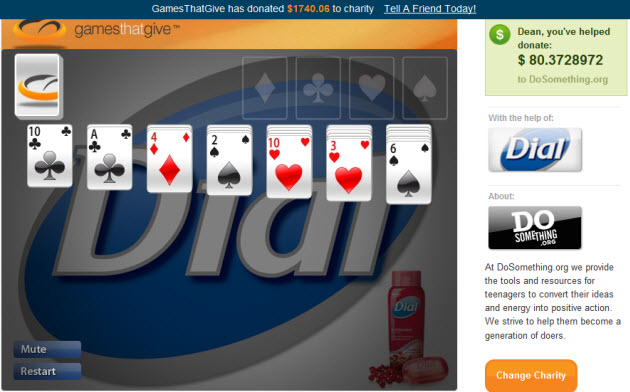 GamesThatGive has figured out a guilt-free way to justify playing video games. The more you play games on its free ad-based site, the more money it donates to charities.
GamesThatGive has figured out a guilt-free way to justify playing video games. The more you play games on its free ad-based site, the more money it donates to charities.
The model has been tried before by companies that seek favor with gamers. But GamesThatGive is donating 70 percent of its proceeds it gets from ads to charity. Stirring up donations is such a critical part of its purpose that it has a running total of its total donations to date at the top of its page. And on every game, you can see how much the game has generated for charities, down to the fraction of a cent (see below). You can pick which charity will receive your donation; since the charities get a big benefit, they steer traffic to GamesThatGive.
I can picture the conversation now: “I can’t wash the dishes, Mom. I’m busy making a donation.” It’s a cool way to help out nonprofits, and it may also be a great business, since a bunch of major advertisers and charities have already jumped on board to help the fledgling site which has been in a quiet launch since July. The advertisers include Pepsi, Starbucks, Domino’s Pizza, Dial, Propel, Quaker and MasterCard. Participating charities include the American Heart Association, the United Way, Unicef, Feeding America, Ronald McDonald House Charities, City Year, the Wilderness Society and the Iraq and Afghanistan Veterans of America.
 Those big partners are a testament to the potential of the idea and the connections of the company’s principal strategist, Cie Nicholson, a former Pepsi executive.
Those big partners are a testament to the potential of the idea and the connections of the company’s principal strategist, Cie Nicholson, a former Pepsi executive.
GamesThatGive is the brainchild of Adam Archer, a former Apple and Microsoft employee who came up with the idea after a couple of years of backpacking. He hiked through the Middle East and Africa, from Istanbul to Capetown, and saw how difficult life was for many people. When he came back home, he tried to figure out why people in wealthy countries weren’t helping others more.
“Everyone said that I wish I was doing more,” Archer said in an interview. “I pressed them for more. They said they didn’t have the time, the money, or know how to give back.”
He took notice of surveys that said 86 percent of Americans want to volunteer, but only 44 percent actually do so. Archer figured that the best way to help charities was to make use of existing behavior, rather than trying to get people to change their behavior. So he created GamesThatGive so that it could let people feel good about playing games and making donations at the same time.
The company has four games available now: Solitaire, Gems, Sudoku, and Bubble Burst. They are based on open source versions of games, but have been customized for GamesThatGive’s site. The company uses open source-based games to keep its costs low, but it expects to add higher-quality games over time.
The games target casual gamers who visit web sites for short breaks. The target gamers include women ages 35 to 50 as well as young males ages 18 to 25. Archer said the company will limit the number of nonprofits receiving donations because it really wants the nonprofits to be motivated to send traffic to the site.
The big split of 70 percent for the charities, 30 percent for the company is also a big motivator for the nonprofits to send traffic to the site. The gamers are spending an average of 13 minutes on the site, a level of engagement that is higher than most sites. As a result, Archer believes GamesThatGive can score higher value ads.
The company has been very capital efficient to date, with only four full-time employees. Since its founding in August, 2008, it has only raised $150,000 in angel money from Eric Klein and other angel investors. Klein and Mark Williamson are both advisors. That money has allowed it to launch a site and start generating advertising revenue. It is seeking a round of about $1.2 million to $1.5 million. And it plans on being profitable in the first quarter of 2011, when it hopes to have a million active monthly users — a fairly modest number.
Over time, the company expects advertisers will offer targeted marketing. If you score high in a game, for instance, Starbucks can offer you a coupon on a coffee drink. Since the quiet launch in July, more than 3,000 gamers have signed up and the company has donated more than $1,700 to charities. The company hit its 1 millionth impression a week ago.
There are competitors out there such as Freerice.com, which donates rice if you play word games. And some big companies try to win favors with consumers by making small donations — such as a 1 percent of revenues — to charities. I think this company can do well, particularly if it comes up with a widget where partners can put games on their own sites. And if it comes up with some killer games, from professional game makers, down the road.
VentureBeat's mission is to be a digital town square for technical decision-makers to gain knowledge about transformative enterprise technology and transact. Learn More
